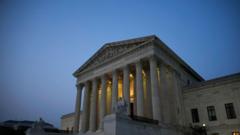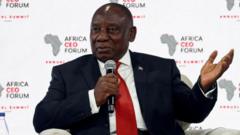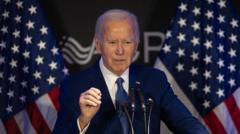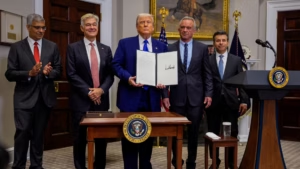The Federal Reserve's chairman Jerome Powell firmly stated he will not resign if requested by President Trump, citing legal restrictions, as the central bank navigates economic turbulence influenced by Trump’s proposed fiscal policies.
Federal Reserve Chairman Tackles Trump’s Speculation on Job Security
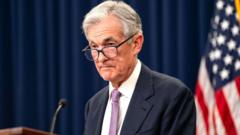
Federal Reserve Chairman Tackles Trump’s Speculation on Job Security
Jerome Powell emphasizes legal protections against presidential termination amid economic uncertainty with Trump's policies.
Federal Reserve Chairman Jerome Powell has publicly addressed rumors surrounding his job security as Donald Trump prepares to take office, asserting that he won't step down if asked. Following the Federal Reserve's announcement of a borrowing cost reduction, Powell emphasized, "it's not permitted under law" for the president to mandate his resignation. Economists express concerns that Trump's plans for tax cuts, immigration reforms, and tariffs could intensify inflationary pressures and complicate economic forecasts.
Trump's agenda includes imposing a minimum 10% import tariff on all incoming goods, a move that economists predict would likely raise consumer prices. Additionally, tax cuts may incentivize spending, further igniting inflation, while mass deportations could deplete the workforce, potentially increasing wage costs. Consequently, interest rates on US debt surged in response to these uncertainties.
In terms of the Fed's outlook, Powell declared that the impact of the incoming administration's policies is not yet clear. "It's such an early stage - we don't know what the policies are, and when they will be implemented,” he clarified. His role as chair began under Trump’s appointment in 2017, although he garnered criticism from the president throughout his tenure.
Recent reports reveal that Trump allies have been exploring ways to diminish Powell's influence at the Fed, including possibly naming a successor. Trump has expressed that he believes in his right to critique the Fed’s actions but has also stated he will respect Powell's term until its completion in 2026, "especially if I thought he was doing the right thing."
Powell's remarks came in light of recent rate cuts after years of increases aimed at tackling rising prices. As inflation peaked above 9% in mid-2022, the Fed reacted by boosting rates significantly, but the current trajectory points towards a reversal as rates have recently decreased. Powell insists on balancing price stability with a healthy job market, even as recent hiring data presents mixed signals regarding economic growth.
Investment strategists foresee that further rate cuts may occur, albeit cautiously. The Bank of England has also voiced concerns regarding inflationary trends that might hinder future reductions in borrowing costs. "In the US, it seems interest rates will stay higher for longer," noted investment strategist Lindsay James, referencing the careful approach the Fed will need to adopt in light of the impending changes in fiscal policy under Trump.
Amid this backdrop of economic transition, Powell remains committed to navigating uncertain waters while assuring the public of the Fed's steadfast commitment to manage the economy effectively.








